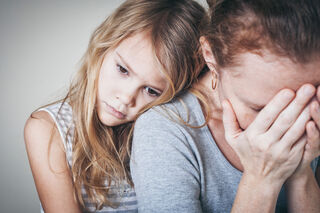Stress
Quarantining is Stressful—What Do We Tell the Kids?
The answer: the truth. With a caveat.
Posted May 15, 2020
I got a text message earlier this week from a dear friend, also a clinical psychologist, containing a link and the words “Science to back up what we know!” I was in the middle of client sessions at the time and so didn’t have time to read the article. In one of those sessions, a mother expressed apprehension about when and how to tell her son that his beloved day camp had just been called off for the summer. In the next, parents wondered how to break the news that their daughter’s longtime nanny had made the decision to work for another family, and that she would soon depart their home. I advised both clients to share the potentially upsetting news with their children as soon as possible.

“Kids always know when something’s up in their family,” I explained. Their nervous systems are in sync with yours; if you’re feeling anxious about something, your child feels anxious too, even if it isn’t conscious and even if they can’t put the feeling into words. Allowing that energy (for lack of a better word) to remain hanging out there, without a name or explanation, is distressing for children. They sense something’s wrong, and yet their person, their trusted grown-up, is pretending everything’s fine. It’s confusing and disorienting.”
A couple of hours later, when I was back to parenting my own little ones, I stole a moment to click on the link my friend had sent. “Children Can Catch Their Mother’s Stress,” the headline read, “Particularly If She Tries to Hide It.” The author went on to describe research findings recently published in the Journal of Family Psychology by Dr. Sarah Waters and her colleagues at Washington State University Vancouver—findings that essentially echoed the words I had spoken to my clients earlier in the day. Science, as my friend had texted, to back up what we, as clinicians, already know.
Waters and her team looked at the impact of parental emotional suppression on children’s (ages 7-11) sympathetic nervous system activation (i.e., stress levels) by having parent-child dyads (N = 107, 47% fathers) participate in a laboratory visit comprised of three separate parts:
- After being separated from their children, parents were subjected to a standardized procedure that’s been shown to activate the body’s primary stress system (i.e., giving a speech and receiving negative feedback).
- Parents were randomly assigned to either a) suppress their affective state (i.e., hide their emotions from their children), or b) act naturally, as they would at home.
- Parents and their children were reunited, and asked to participate in three interactions: a six-minute conversation about a source of conflict in their relationship, followed by a six-minute cooperation task (block building) and then six minutes of free play.
The researchers found that, in the “suppression” condition of the experiment, parents and children were less warm and engaged when interacting (as rated by trained observers), and that activation of the mothers’ nervous systems was related to activation of their children’s nervous systems shortly thereafter. These findings were not present in the control group—the one that was not instructed to suppress their emotions in response to the stressor. Just as interesting, it also wasn’t present between fathers and children—perhaps due to the fact that men are, in general, more likely than women to say they’re fine when they’re not, and so their children potentially less affected by it.
Putting aside the fact that this study, like all others, had certain limitations, what does all this mean? And, more importantly, why should we, as parents, care? The answer is simple: because, as parents, when we are stressed out but pretend otherwise we actively transmit that stress to our children. Our children feel it. Their nervous systems pick up on it and mirror ours.
So what can we do?
- Stop thinking you are protecting your children by shielding them from your stress. The opposite is, in fact, more likely: You may actually increase your children’s stress by not sharing your feelings with them. Note that this is not permission to throw away all boundaries and unload your adult problems on your little ones! But if you are stressed—about anything from your current lack of childcare, to the pandemic more broadly, to the current political climate, to the actual climate, to anything at all—your children will benefit if you let them in on how you feel. By all means, filter the information so that it’s appropriate for kids, dilute it so that it’s not overwhelming, or even just say that you’re worried about “grown-up stuff” and nothing more. Just don’t pretend you’re fine when you’re not. No one wins.
- Stop saying, once and for all, that you don’t want to “plant the seed” by sharing information with your child. The seed has been planted—nonverbally, yes, but planted nonetheless. If your child “seems fine,” it may well be that he is taking his cues from you—putting on a happy face despite feeling otherwise. Open the lines of verbal communication by naming the feelings in the room. Everyone will be better off. Which leads to:
- Do not “Put on a Happy Face.” Actually, it’s complicated. Research shows that consciously and intentionally cultivating gratitude improves one’s mood, as does focusing on what’s good in the world. Both of these practices are worthwhile and highly encouraged during stressful times like these. They are not, though, the same as “faking it.” The first offers an opportunity to model for your child: “I am feeling stressed. I am going to get on my computer and find some good news stories to focus on.” The latter just adds fuel to the fire.
There’s no doubt that times are tough, regardless of your circumstances. You know it, and I know it. Pretending otherwise amounts to a subtle form of gaslighting. It doesn’t help anyone—especially our kids.


